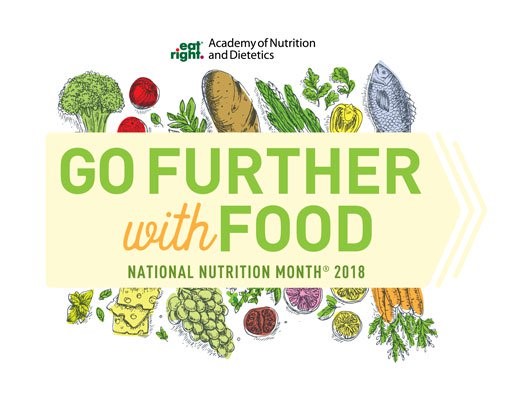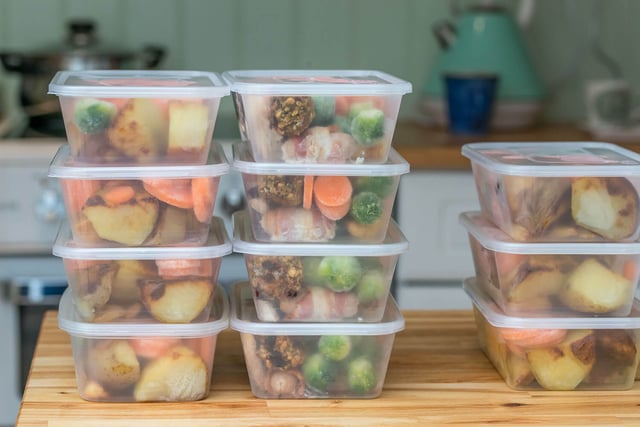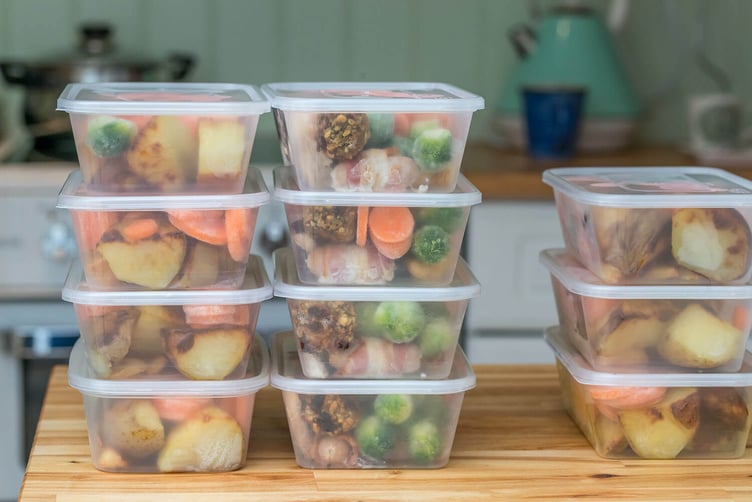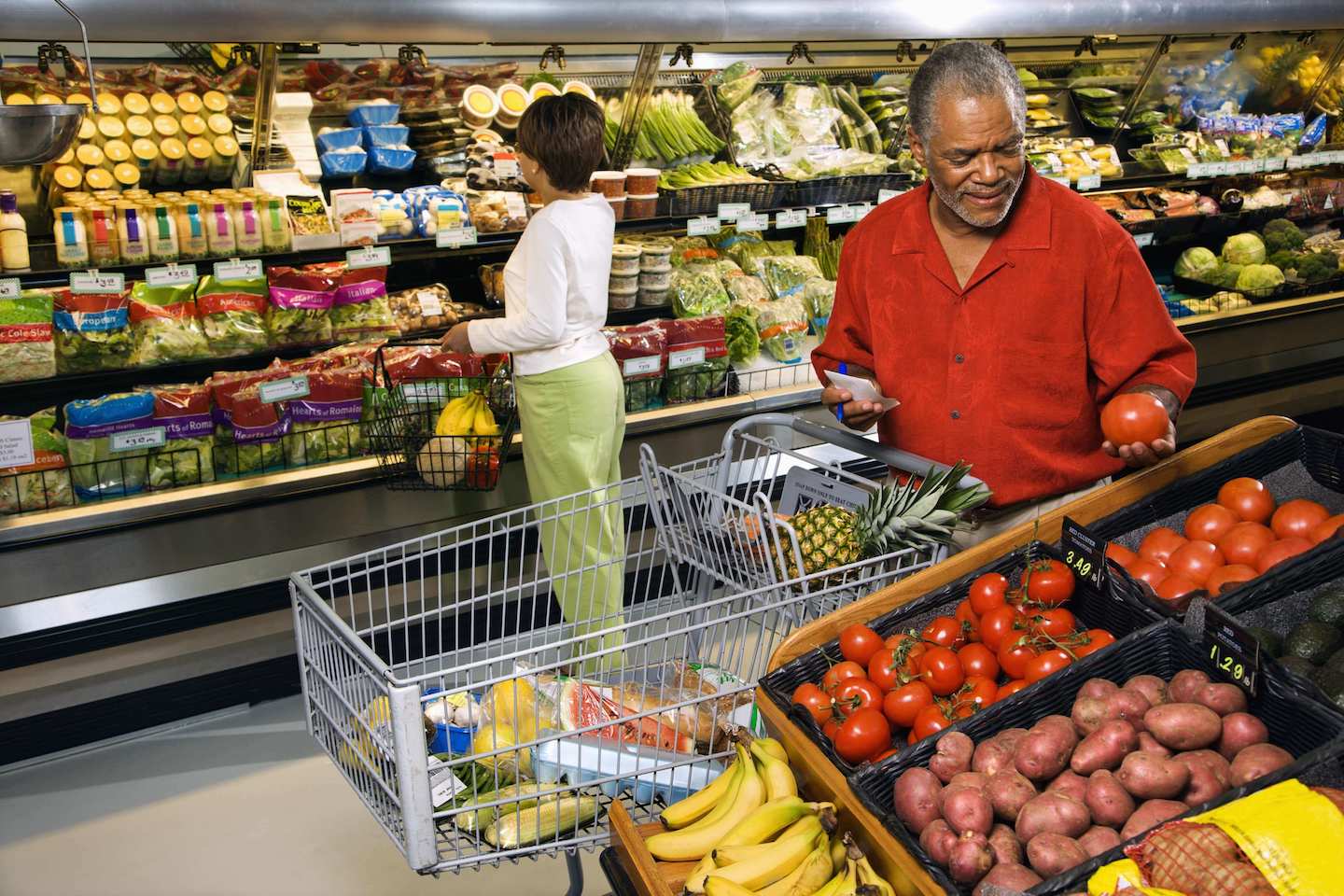March is National Nutrition Month (NNM). As a Registered Dietitian Nutritionist (RDN), this is my favorite month of the year. It is a time that nearly everyone is talking about nutrition; not just food, but NUTRITION. It is a time to talk about the direct impact foods such as vegetables, fruits, and legumes have on our health.
This year, the theme of NNM is “Go Further with Food.” This applies to many areas of our lives including our day to day food choices, environmental health, financial health, physical health, and longevity.

Daily Food Choices
The foods we choose at each and every meal or snack determine how much fuel we will have for the day’s activities. Choosing foods that provide energy for extended periods can help us go further and achieve more. High fiber foods (or complex carbohydrates) are great sources of energy that take you further as well as keep you full and satisfied.
Complex or “good” carbohydrates include vegetables, fruits, legumes (beans & lentils), nuts, seeds, and whole, intact grains. These foods are excellent choices for many other reasons as well. They include powerful antioxidants, phytochemicals, vitamins, minerals, protein, and healthy fats.
One way to ensure we consume these foods to fuel our body is by meal planning. Meal planning may seem like a task you just don’t have time for, but believe it or not, meal planning can actually save time. Taking time to plan your meals for the week prevents taking the time each day or at each meal to decide what to eat. Spur of the moment decisions often mean an extra trip to the grocery store to pick up items needed for a recipe.
Furthermore, last minute meal decisions tend to be less healthy. By the time we start thinking about what to eat, we are typically overly hungry and any food will do. This often leads to grabbing food at a drive-thru, stopping at a restaurant, or choosing highly processed foods that take little or no time to prepare.

Environmental Health
Meal planning also helps to manage our food resources and prevent food waste at home. It’s estimated that roughly 300 pounds of food per American is thrown away each year. By planning meals, we can purchase just the foods we need in appropriate portions. If we stick to our meal plan, we use the foods we purchased and they don’t spoil in the refrigerator or pantry.
This also means that we cook a suitable amount of food so that we can eat it all and not toss leftovers. A time-saving option is to prepare more than you need for one day and freeze the leftovers for a quick meal in the future.
Proper storage helps fresh fruits and vegetables go further by extending their shelf life. Storing fresh foods that will spoil in plain sight helps to ensure we will use them. Instead of hiding kale at the back of the refrigerator, place it in the front where you see it every time you open the door.
Learn which foods should be refrigerated and which foods to store together.
Another way to keep foods longer is to freeze them. Some foods can simply be frozen as is, while others may need a little prep before freezing. Check out Blanch Before You Freeze for tips on successfully freezing vegetables.

Financial Health
Meal planning saves money in several ways. Planning meals and creating a shopping list cuts down on the extras we buy at the grocery store. Planning meals based on foods we already have further reduces our grocery bill while also preventing food waste.
Plan to use leftovers! This is a great way to save money and cut down on wasted food. Plus, leftovers don’t have to be consumed the same way the next day. Get creative by transforming a meal into a soup or salad. Leftover chili can be placed over greens to make a Southwestern salad for a quick lunch, or leftover salad can be a stuffed pita or sandwich the next day.
The cost of fruits and vegetables is often cited as a barrier to consuming more of these nutrient rich foods. Fruits and vegetables are among the top foods that are wasted. Not only does this waste money but it also wastes nutrients. If we plan our meals a few days or a week in advance we can purchase just the necessary amount of fresh fruits and vegetables and consume them before they spoil.
Prepping vegetables as soon as you get home from the grocery store makes them quick and easy to eat at meal time. Be aware, this reduces their shelf life so be sure to use them in a timely manner!
Even if we end up at a restaurant or drive-thru, we can save money. While the advertisements might tell you that paying more for the bigger size is a better value, stick to the smaller portion to save your wallet and your waistline.
Another way to save at restaurants is to make two (or more) meals out of the restaurant portion. The serving sizes at most restaurants is much larger than what we actually need. Ask for a to-go container at the start of the meal and put half of the meal in the container before you start eating.
Physical Health & Longevity
Food can take us further by helping us live longer, healthier lives. The longest lived populations around the world (known as Blue Zones) consume primarily plant-based diets. Consuming nutrient dense plant foods such as vegetables, fruits, and legumes has the power to prevent and even reverse many of the chronic diseases plaguing Americans such as heart disease, cancer, and type 2 diabetes.
Whole food based diets are packed with nutrients, including antioxidants and phytochemicals, which reduce inflammation in the body. This is just one of the reasons those living in Blue Zones rarely suffer from chronic illnesses common in the US, such as cancer and heart disease.
Best and worst foods for health and longevity, by Dr. Joel Fuhrman.
Plant based diets have the power to improve our day to day living as well. Research (several links below) has shown that plant based diets can significantly improve depression, anxiety, and even productivity. Plant based eaters tend to sleep better, maintain a healthy weight, get sick less often, have fewer allergies, less stress, and more energy.
Improve your physical, financial, and environmental health and go further with food in 2018!
Resources:
- Academy of Nutrition and Dietetics. National Nutrition Month. https://www.eatright.org/food/resources/national-nutrition-month/national-nutrition-month-celebration-toolkit. 2018.
Depression, Anxiety & Productivity:
- A L Lopresti, S D Hood, P D Drummond. A review of lifestyle factors that contribute to important pathways associated with major depression: diet, sleep and exercise. J Affect Disord. 2013 May 15;148(1):12-27.
- U Agarwal, S Mishra, J Xu, S Levin, J Gonzales, N D Barnard. A multicenter randomized controlled trial of a nutrition intervention program in a multiethnic adult population in the corporate setting reduces depression and anxiety and improves quality of life: the GEICO study. Am J Health Promot. 2015 Mar-Apr;29(4):245-54.
- J S Lai, S Hiles, A Bisquera, A J Hure, M McEvoy. A systematic review and meta-analysis of dietary patterns and depression in community-dwelling adults. Am J Clin Nutr. 2014 Jan;99(1):181-97.
- Y T Szeto, T C Kwok, I F Benzie. Effects of a long-term vegetarian diet on biomarkers of antioxidant status and cardiovascular disease risk. Nutrition. 2004 Oct;20(10):863-6.
- H I Katcher, H R Ferdowsian, V J Hoover, J L Cohen, N D Barnard. A worksite vegan nutrition program is well-accepted and improves health-related quality of life and work productivity. Ann Nutr Metab. 2010;56(4):245-52. doi: 10.1159/000288281. Epub 2010 Apr 14.
- G D Brinkworth, J D BUchley, M Noakes, P M Clifton, C J Wilson. Long-term effects of a very low-carbohydrate diet and a low-fat diet on mood and cognitive function. Arch Intern Med. 2009 Nov 9;169(20):1873-80.
- B L Beezhold, C S Johnston. Restriction of meat, fish, and poultry in omnivores improves mood: a pilot randomized controlled trial. Nutr J. 2012 Feb 14;11:9.
- J J Wurtman, A Brzezinski, R J Wurtman, B Laferrere. Effect of nutrient intake on premenstrual depression. Am J Obstet Gynecol. 1989 Nov;161(5):1228-34.
- A A Farooqui, L A Horrocks, T Farooqui. Modulation of inflammation in brain: a matter of fat. J Neurochem. 2007 May;101(3):577-99.
- B L Beezhold, C S Johnston, D R Daigle. Vegetarian diets are associated with healthy mood states: a cross-sectional study in seventh day adventist adults. Nutr J. 2010 Jun 1;9:26.
- J S Vaz, G Kac, A E Nardi, J R Hibbein. Omega-6 fatty acids and greater likelihood of suicide risk and major depression in early pregnancy. J Affect Disord. 2014 Jan;152-154:76-82.





